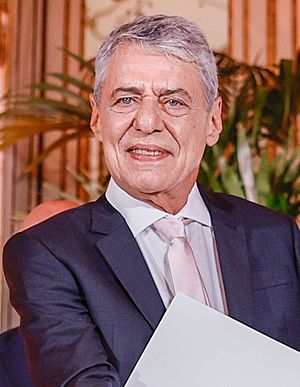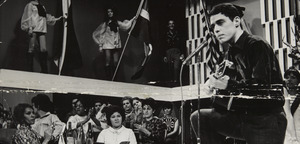Chico Buarque facts for kids
Quick facts for kids
Chico Buarque
|
|
|---|---|

Buarque in 2023
|
|
| Born |
Francisco Buarque de Hollanda
19 June 1944 Rio de Janeiro, Brazil
|
| Alma mater | University of São Paulo |
| Occupation |
|
| Years active | 1962–present |
|
Notable work
|
|
| Spouse(s) |
Marieta Severo
(m. 1966; div. 1999)Carol Proner
(m. 2021) |
| Children |
|
| Musical career | |
| Genres |
|
| Labels |
|
| Associated acts |
|
| Signature | |
 |
|
Francisco Buarque de Hollanda (born 19 June 1944), known as Chico Buarque, is a famous Brazilian singer, songwriter, and writer. He is also a guitarist, composer, playwright, and poet. He is most famous for his music, which often shares ideas about Brazilian society and culture.
Chico Buarque grew up in different cities, including Rio de Janeiro, São Paulo, and Rome. His father was a well-known historian. As a child, Chico loved to read and write. He also discovered music through the bossa nova style, especially the songs of Tom Jobim and João Gilberto.
In the 1960s, Chico started performing as a singer and guitarist. He also wrote a play that the Brazilian military government at the time thought was dangerous. Because of this, Chico and other musicians faced threats from the government. He left Brazil for Italy in 1969.
However, Chico returned to Brazil in 1970. He continued to make music and write, even though the government often tried to stop his work. He released many albums in the 1980s and published several novels in the 1990s and 2000s.
In 2019, Chico Buarque received the Camões Prize. This is the most important award for literature written in the Portuguese language. He finally received the award in April 2023. He has also won eleven Brazilian Music Awards, which are the top awards for Brazilian music.
Contents
Early Life and Musical Start
Chico Buarque was born in Rio de Janeiro on 19 June 1944. He came from a very smart family. His father, Sérgio Buarque de Holanda, was a famous historian and journalist. His mother, Maria Amélia Cesário Alvim, was a painter and pianist. His sisters, Miúcha, Cristina Buarque, and Ana de Hollanda, also became well-known.
As a child, Chico was very impressed by bossa nova music, especially the songs of Tom Jobim and João Gilberto. He also loved writing and wrote his first short story when he was 18. He studied European literature from a young age. One of his biggest interests was playing football, which he started at age four and continued to play even in his 60s.
Before becoming a musician, Chico started studying architecture at the University of São Paulo. But he often skipped classes and did not become an architect.
Chico first performed as a musician and composer in 1964. He quickly became famous at music festivals and on TV shows. This was when bossa nova music became popular. Another singer, Nara Leão, recorded three of his songs.
His first album, Chico Buarque de Hollanda, showed his future style. It had catchy samba songs with clever words and a touch of sadness. Chico had his first big hit with "A Banda" in 1966. This song was about a marching band. He soon released more popular songs.
Even though he started with bossa nova, Chico also explored samba and Música popular brasileira (MPB) throughout his career. Some musicians, like Caetano Veloso and Gilberto Gil, thought his music was too old-fashioned.
Facing Challenges and Speaking Out
In 1968, Chico wrote a play called Roda Viva ("Live Circle"). The military government did not like it, and Chico was put in prison for a short time because of it. He then left Brazil for Italy for 18 months in 1970.
When he returned, he wrote his first novel in 1972, which was not stopped by the government. Around this time, he also released a protest song called "Apesar de Você" ("In spite of You"). This song was secretly about the military government. The government censors (people who check and stop things they don't like) missed it at first. It became an important song for people who wanted democracy.
After selling over 100,000 copies, the song was finally censored and removed from stores. In 1974, the censors even banned any song written by Chico Buarque. So, he created a fake name, "Julinho de Adelaide." He even made up a life story and gave interviews to newspapers as "Julinho." "Julinho de Adelaide" wrote songs like "Jorge Maravilha" and "Acorda Amor." But eventually, a newspaper found out his secret.
Chico also wrote a play called Calabar. It was about the Dutch invasion of Brazil in the 1600s. He used this story to show similarities with the military government at the time. Despite the censorship, songs like "Samba de Orly" (1970) and "Acorda amor" (1974) continued to show Chico's opposition to the military government.
In the 1970s and 1980s, he worked with filmmakers, playwrights, and musicians to create more protest works against the government. Chico also used his music to talk about Brazil becoming a democracy again. He wrote a novel called Budapeste, which won the Prêmio Jabuti. This is a Brazilian literary award similar to the Booker Prize.
His 2017 album Caravanas was named the 3rd best Brazilian album of that year by the Brazilian edition of Rolling Stone magazine.
Awards and Recognitions
- 2010 São Paulo Prize for Literature — Nominated for Best Book of the Year for Leite Derramado
- 2013 Casa de las Américas prize for Spilt Milk
- 2019 Camões Prize
Discography
- 1966: Chico Buarque de Hollanda (Vol. 1)
- 1966: Morte e Vida Severina
- 1967: Chico Buarque de Hollanda (Vol. 2)
- 1968: Chico Buarque de Hollanda (Vol. 3)
- 1969: Umas e outras – compacto
- 1969: Chico Buarque na Itália
- 1970: Apesar de você
- 1970: Per un pugno di samba
- 1970: Chico Buarque de Hollanda (Vol. 4)
- 1971: Construção
- 1972: Quando o carnaval chegar
- 1972: Caetano e Chico - juntos e ao vivo
- 1973: Chico canta
- 1974: Sinal fechado
- 1975: Chico Buarque & Maria Bethânia ao vivo
- 1976: Meus caros amigos
- 1977: Cio da Terra compacto
- 1977: Os saltimbancos
- 1977: Gota d'água
- 1978: Chico Buarque
- 1979: Ópera do Malandro
- 1980: Vida
- 1980: Show 1º de Maio compacto
- 1981: Almanaque
- 1981: Saltimbancos trapalhões
- 1982: Chico Buarque en espanhol
- 1983: Para viver um grande amor
- 1983: O grande circo místico
- 1984: Chico Buarque (Vermelho)
- 1985: O Corsário do rei
- 1985: Ópera do Malandro
- 1985: Malandro
- 1986: Melhores momentos de Chico & Caetano
- 1987: Francisco
- 1988: Dança da meia-lua
- 1989: Chico Buarque
- 1990: Chico Buarque ao vivo Paris le Zenith
- 1992: Convite Para Ouvir
- 1993: Para Todos
- 1995: Uma palavra
- 1997: Terra
- 1998: As cidades
- 1998: Chico Buarque da Mangueira
- 1999: Chico ao vivo
- 2001: Chico e as cidades (DVD)
- 2001: Cambaio
- 2002: Chico Buarque – Duetos
- 2003: Chico ou o país da delicadeza perdida (DVD)
- 2005: Meu Caro Amigo (DVD)
- 2005: A Flor da Pele (DVD)
- 2005: Vai passar (DVD)
- 2005: Anos Dourados (DVD)
- 2005: Estação Derradeira (DVD)
- 2005: Bastidores (DVD)
- 2006: O Futebol (DVD)
- 2006: Romance (DVD)
- 2006: Uma Palavra (DVD)
- 2006: Carioca (CD + DVD with the documentary Desconstrução)
- 2007: Carioca Ao Vivo
- 2011: Chico Buarque
- 2012: Na Carreira (DVD)
- 2017: Caravanas
- 2018: "Caravanas - Ao vivo"
Other Works
Books
|
Plays
|
Film
|
Images for kids
See also
 In Spanish: Chico Buarque para niños
In Spanish: Chico Buarque para niños
 | Percy Lavon Julian |
 | Katherine Johnson |
 | George Washington Carver |
 | Annie Easley |



